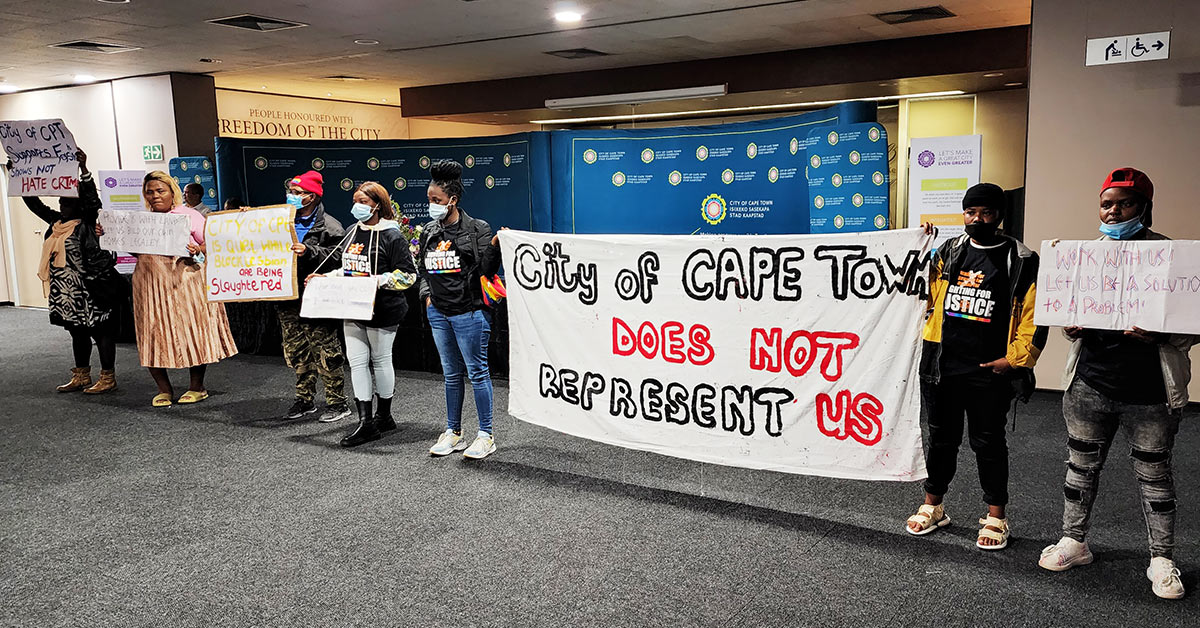Cape Town activists protest at opening of LGBTIQ+ conference

Apparent divisions within the LGBTQI+ community came to the fore at a reception for the southern African Kopano gathering in Cape Town as some protested the City’s involvement with the event.
Organised by the Johannesburg-based The Other Foundation, the week-long Kopano conference is an opportunity for LGBTQI+ activists from across the region to come together to share their experiences, challenges and success.
The Other Foundation is a trust that sources and offers funding and support to groups and initiatives that advance “equality and freedom in southern Africa with a particular focus on sexual orientation and gender identity.”
Kopano is typically held every two years but was delayed to 2022 due to the Covid pandemic. With delegates from 17 countries, this year’s event is taking place at UCT; the first time the gathering has been held outside of Gauteng.
On Monday, Cape Town-based LGBTQI+ groups Triangle Project and Free Gender lashed out at the organisers’ decision “to partner with the City of Cape Town to host a welcoming reception” at the civic centre on Monday evening.
Members of the group held a protest at the cocktail event, holding up placards accusing the City of marginalising black queer people and insisting that “the City of Cape Town is not our ally.”
“If the Kopano convening committee had our backs, they would have reached out to learn and taken guidance from us on how the City of Cape Town continues to fail and blatantly disregard the experiences of black LGBTQI+ people in the metro,” said Triangle Project and Free Gender in a statement.
“The Cape Metro is a hotspot for hate crimes against LGBTQI+ people in the country,” they continued. “Contrary to what its slogan says, the City of Cape Town has never worked for us, not for LGBTQI+ people, not for women and children, not for the working poor, not for sex workers, not for people who use drugs, not for undocumented refugees from other African countries.”
As an example, the groups claim that while the City supports Cape Town Pride, it has refused to provide resources to Khumbulani Pride, an event held outside the city centre that “was established to remember all the victims and survivors of hate crimes over time, as well as celebrate resistance to homo- and transphobia in local communities.”
The groups further cited the City’s often-criticised and inhumane policies on homelessness and its failure to provide adequate housing and support for people living on the streets.
“LGBTQI+ youth are homeless because they are kicked out of family homes for who they are. But LGBTQI+ people have nowhere to turn for a roof over their heads due to lack of shelters,” said Triangle Project and Free Gender.
They are further dissatisfied that Kopano is being held on the UCT campus, which they believe “is a space far removed from the centres of queer organising in Cape Town and a space that represents the city’s issues around access and exclusion for black marginalised people especially.”
Triangle Project and Free Gender insisted that they “cannot justify or accept a space where the City of Cape Town is allowed to posture and pretend to be an Ally to ALL LGBTQI+ people.”
Liberty Matthyse, Executive Director of Gender Dynamix, took to the stage at the reception to passionately support the protestors in their criticism of the City, stating that “only certain queer organisations and queer people get to have the City’s ear, and that falls along gender lines, racial lines and class lines.”
Speaking to MambaOnline, The Other Foundation CEO Neville Gabriel asserted that the organisation stood with the protestors in their criticism of the city, and supported their demands. “Not only the foundation, but the core convening committee, which is made up of different organisations, absolutely, totally and fully agree with the analysis that informs [the protestor’s] position entirely,” said Gabriel.
He clarified that the foundation had not partnered with the City but had simply requested that it host the reception. “The idea was that if we have 280 LGBTQI+ representatives from across southern Africa and beyond converging on Cape Town, this City ought to intentionally and deliberately welcome this group to the city.”
Gabriel also believes that the reception “gave the opportunity for LGBTQI+ voices, including black-led LGBTQI+ organisations, to have direct engagement with the City on those issues of division, exclusion, and the lack of change of geospatial racial, economic, and many other divides in the city.”
When it comes to holding the Kopano at UCT, Neville, argues that its very presence on the campus will help advance the institution’s transformation. “The University is a public institution, it’s not a private institution. It has been going through a transformation process that it has been struggling with, including on LGBTQI+ issues. They’ve been reaching out to LGBTQI+ groups to help them to do that. And we must. It’s not appropriate or transformative when people are asking for help to stand back and say we’re not going to be there to make this work.”
Leave a Reply